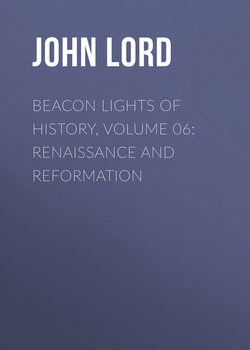Beacon Lights of History, Volume 06: Renaissance and Reformation

Реклама. ООО «ЛитРес», ИНН: 7719571260.
Оглавление
John Lord. Beacon Lights of History, Volume 06: Renaissance and Reformation
DANTE
AUTHORITIES
GEOFFREY CHAUCER
AUTHORITIES
CHRISTOPHER COLUMBUS
AUTHORITIES
SAVONAROLA
AUTHORITIES
MICHAEL ANGELO
AUTHORITIES
MARTIN LUTHER
AUTHORITIES
THOMAS CRANMER
AUTHORITIES
IGNATIUS LOYOLA
AUTHORITIES
JOHN CALVIN
AUTHORITIES
FRANCIS BACON
AUTHORITIES
GALILEO
AUTHORITIES
Отрывок из книги
Poets are the great artists of language. They even create languages, like Homer and Shakspeare. They are the ornaments of literature. But they are more than ornaments. They are the sages whose sayings are treasured up and valued and quoted from age to age, because of the inspiration which is given to them,–an insight into the mysteries of the soul and the secrets of life. A good song is never lost; a good poem is never buried, like a system of philosophy, but has an inherent vitality, like the melodies of the son of Jesse. Real poetry is something, too, beyond elaborate versification, which is one of the literary fashions, and passes away like other fashions unless redeemed by something that arouses the soul, and elevates it, and appeals to the consciousness of universal humanity. It is the poets who make revelations, like prophets and sages of old; it is they who invest history with interest, like Shakspeare and Racine, and preserve what is most vital and valuable in it. They even adorn philosophy, like Lucretius, when he speculated on the systems of the Ionian philosophers. They certainly impress powerfully on the mind the truths of theology, as Watts and Cowper and Wesley did in their noble lyrics. So that the most rapt and imaginative of men, if artists, utilize the whole realm of knowledge, and diffuse it, and perpetuate it in artistic forms. But real poets are rare, even if there are many who glory in the jingle of language and the structure of rhyme. Poetry, to live, must have a soul, and it must combine rare things,–art, music, genius, original thought, wisdom made still richer by learning, and, above all, a power of appealing to inner sentiments, which all feel, yet are reluctant to express. So choice are the gifts, so grand are the qualities, so varied the attainments of truly great poets, that very few are born in a whole generation and in nations that number twenty or forty millions of people. They are the rarest of gifted men. Every nation can boast of its illustrious lawyers, statesmen, physicians, and orators; but they can point only to a few of their poets with pride. We can count on the fingers of one of our hands all those worthy of poetic fame who now live in this great country of intellectual and civilized men,–one for every ten millions. How great the pre-eminence even of ordinary poets! How very great the pre-eminence of those few whom all ages and nations admire!
The critics assign to Dante a pre-eminence over most of those we call immortal. Only two or three other poets in the whole realm of literature, ancient or modern, dispute his throne. We compare him with Homer and Shakspeare, and perhaps Goethe, alone. Civilization glories in Virgil, Milton, Tasso, Racine, Pope, and Byron,–all immortal artists; but it points to only four men concerning whose transcendent creative power there is unanimity of judgment,–prodigies of genius, to whose influence and fame we can assign no limits; stars of such surpassing brilliancy that we can only gaze and wonder,–growing brighter and brighter, too, with the progress of ages; so remarkable that no barbarism will ever obscure their brightness, so original that all imitation of them becomes impossible and absurd. So great is original genius, directed by art and consecrated to lofty sentiments.
.....
The great artist, kindled by his visions of imperishable loveliness in the person of his departed Beatrice, now resolves to dedicate to her honor his great life-labor,–even his immortal poem, which should be a transcript of his thoughts, a mirror of his life, a record of his sorrows, a painting of his experiences, a description of what he saw, a digest of his great meditations, a thesaurus of the treasures of the Mediaeval age, an exposition of its great and leading ideas in philosophy and in religion. Every great man wishes to leave behind some monument of his labors, to bless or instruct mankind. Any man without some form of this noble ambition lives in vain, even if his monument be no more than a cultivated farm rescued from wildness and sterility.
Now Dante's monument is "the marvellous, mystic, unfathomable song," in which he sang his sorrows and his joys, revealed his visions, and recorded the passions and sentiments of his age. It never can be popular, because it is so difficult to be understood, and because its leading ideas are not in harmony with those which are now received. I doubt if anybody can delight in that poem, unless he sympathizes with the ideas of the Middle Ages; or, at least, unless he is familiar with them, and with the historical characters who lived in those turbulent and gloomy times. There is more talk and pretension about that book than any one that I know of. Like the "Faerie Queene" or the "Paradise Lost," it is a study rather than a recreation; one of those productions which an educated person ought to read in the course of his life, and which if he can read in the original, and has read, is apt to boast of,–like climbing a lofty mountain, enjoyable to some with youth and vigor and enthusiasm and love of nature, but a very toilsome thing to most people, especially if old and short-winded and gouty.
.....